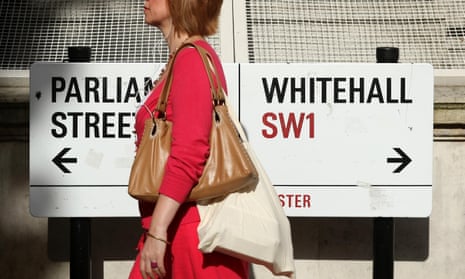Compared with their American counterparts, British civil servants have, in theory, somewhat less to fear from recent political upheaval. While more than 4,000 new political appointees will parachute in to run federal departments, agencies and embassies after Donald Trump is sworn in, most of those required to navigate Britain’s equally momentous departure from the EU remain career officials, answering to whichever politicians are in power.
But the resignation of Sir Ivan Rogers, Britain’s permanent representative to the EU, has reopened debates dating back centuries over whether such an independent structure is fit for purpose in today’s highly politicised Whitehall environment.
Eurosceptics rejoiced at his departure, claiming his warnings about the difficulties of Brexit were symbolic of bureaucratic resistance to the will of the British people. Civil service representatives have hit back at the failure of ministers to defend the principle that their mandarins need to provide impartial advice, regardless of whether it is what political masters want to hear.
Unhappiness about Brexit among civil servants is no surprise. Many have built careers around becoming experts in the complex interplay between Brussels and Whitehall. Such was the level of private misgiving after June’s referendum result that one government lawyer has said there was an informal self-help group to provide counselling sessions to officials struggling to cope with implementing something they felt was a terrible mistake.
But those who know him dispute suggestions that our man in Brussels had simply gone native. “The irony is that Ivan Rogers was part of a Treasury takeover of European relations because they were seen as less easily captured by foreigners,” says Mark Leonard of the European Council on Foreign Relations. “If now even this expertise is being swept away too, you are seeing a double undermining of the professional classes.”
Following similar Downing Street anger at an independent report that warned an additional 30,000 civil servants were needed to implement Brexit, there is a growing fear in Whitehall that politicians no longer want to hear bad news, even when presented neutrally.
“This is probably the most difficult clash between politicians and the civil service that the country has seen for a generation,” says Leonard. “The message that it sends out to the rest of the civil service is that if you put a political foot wrong you could be out on your ear. It will send shockwaves through the system.”
“The only thing I can think with parallels is the run-up to the Iraq war, where there were similar deep misgivings in Whitehall about the political direction,” he adds.
The Foreign Office still has a long way to go before it reaches Washington levels of politicisation. Most US ambassadors to plum postings in wealthier countries are not just political appointees, but have been rewarded as the president’s richest donors.
Theresa May was said to have resisted parachuting in an overtly political replacement for Rogers, such as Brexit champions Michael Gove and Nigel Farage.
Ironically, the critical interview given by the prime minister that first raised fears among civil servants also included instructions to them to give her unvarnished advice. There was a “a tendency in the system to try to interpret what they think you want, and to deliver that”, she told the Spectator last month. “Don’t try to tell me what you think I want to hear. I want your advice, I want the options,” she said.
Yet waves of cuts in Whitehall in recent years have left the austerity-ravaged machinery of government feeling unloved and under-resourced at the best of times. The consequences of a disorderly Brexit, where UK civil servants have to suddenly step in and perform the countless “competences” now devolved to the EU, could put intolerable strain on an already creaking system.
In this context, the fear is not that the government will suddenly decide to make hundreds of US-style political appointments, but that much-needed talent will be sidelined if it is seen as out of step with the prevailing mood.
“It will mean politicisation more like other European countries, such as France where you have a hybrid civil service,” says Leonard. In such systems there are few direct political appointees, but many top officials whose political persuasions are well known; who thrive under a certain type of government and linger in more junior roles when it is out of power.
It would be an ironic twist for British mandarins if the escape from European bureaucracy left them looking more like their continental cousins.
